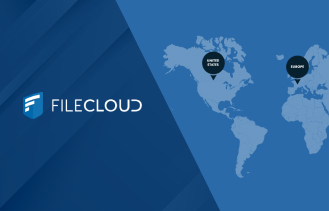Peter Melerud, Chief Revenue Officer (CRO) at FileCloud
We will become the standard for secure information and content sharing among users in Israel,” said Peter Melerud, Chief Revenue Officer (CRO) at FileCloud, which recently entered the local market through Messagenet.
“The world of information and content sharing offers a variety of solutions for both business and personal use, from Google Drive to Dropbox and other information sharing services. However, what is primarily lacking for organizations are capabilities for sharing organizational information and content, which is often commercially sensitive or specially classified—sharing information with a focus on user permissions and an emphasis on information and content security. We chose to start operating in Israel, and I estimate that within a short period, our solution will effectively become the standard for managing secure organizational information and content,” Melerud said in an interview with People and Computers.
The interview with Melerud was conducted against the backdrop of FileCloud’s entry into Israel: Messagenet, which markets and provides software solutions in the fields of cybersecurity, information security, and protection of sensitive information and infrastructure, has recently begun representing the secure information and content sharing giant in the local market.
“Organizations of all types and sizes,” said Melerud, “need to build and implement a strategy for GRC – governance, risk management, and compliance. The company has developed a secure solution for information sharing, including unstructured data—file sharing and synchronization, and access to distributed content found anywhere.”
Regarding information security, Melerud noted, “We are the only ones in the market implementing the ‘Zero Trust’ concept in data and content sharing, Zero Trust Sharing. We do this while complying with various regulations in different industry sectors, with enhanced capabilities for protecting against data leaks, while preserving and managing digital rights.” He added, “Our platform provides workflow automation, with the ability to control content sharing across most organizational platforms. To protect content from cyber threats and security risks, our solution meets most of the common regulations and standards in the market, including GDPR for privacy protection, HIPAA for healthcare, NIST, and others.”
“Our solution serves millions of users worldwide, including leading global corporations, educational institutions, government organizations, and managed service providers (CSPs),” he said. “About half of our enterprise clients are from the government-public sector and security sector, with a significant portion coming from healthcare, pharma, and academia, where numerous confidential content shares occur between researchers, lecturers, and students.” Among the enterprise clients are the U.S. Army Corps of Engineers, Reuters, Deloitte, NASA, and Toyota.
“Due to the global shift of organizations to cloud environments,” he explained, “managing content sharing has become easier. However, in cloud environments, the organization loses some of its control capabilities—where specific content is located, who is using it, and whether everyone sharing the content is indeed authorized to view it. Clearly, we are not competing with the content sharing offerings provided by public clouds, as our solution is much more secure. Today’s organizational content is distributed—on-premises, in public clouds, private clouds, and hybrid computing environments—and our solution is the only one covering all these different environments. Thus, we adapt our solution to the way the client does business, addressing local, public, and hybrid clouds, as well as supporting organizations with remote branches.”
“Flexibility is a top value for us. This flexibility manifests in several ways—ease of operation, integration capabilities with various content management solutions that are not ours. Additional flexibility comes from the simplicity of our system, which integrates with other systems, including security systems, such as McAfee, Symantec, Okta, Salesforce, AWS, and Arxan (formerly CA).”
Recently, Melerud said, “We have added more advanced capabilities and new products to help customers meet their data protection requirements. Our goal is to provide solutions that allow enterprise customers to balance risk management with the need to share content—both within and outside the organization.”
“Data,” he said, “is the crown jewel of the organization; it is the most valuable asset that organizations produce. This is why protecting it and ensuring it is handled properly is a top priority for executives and senior management. Thus, we have added more capabilities to our smart content classification system, including precise metadata handling. We have also added artificial intelligence capabilities so that organizations, which are increasingly experimenting with cloud-based large language models (LLMs), can utilize AI within their infrastructure. This new functionality will enable the use of simple and accessible natural language to define how content should be classified and tagged. We will expand support for additional LLM models in the future.”
“Following our entry into the Israeli market,” Melerud concluded, “we will deepen our collaborations with Messagenet to become a significant player in Israel in the field of secure content management and sharing between users.”
Yaron Hamami, Chief Business Development Officer at Messagenet, said, “From our discussions with many organizations in the country, it is clear that the market is more eager than ever for a solution for high-quality, professional, and secure information and content sharing. We are in a very interesting and challenging period and expect an acceleration in our activity across the entire market and particularly in the field of secure information and content sharing. 2025 will be the breakthrough year for this field in the local market.”




